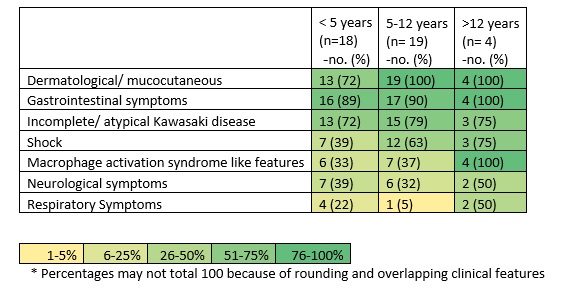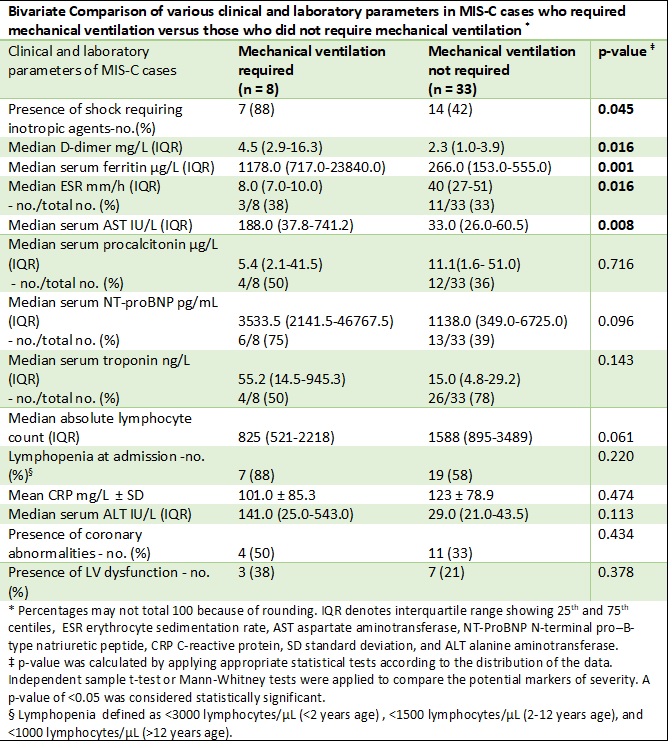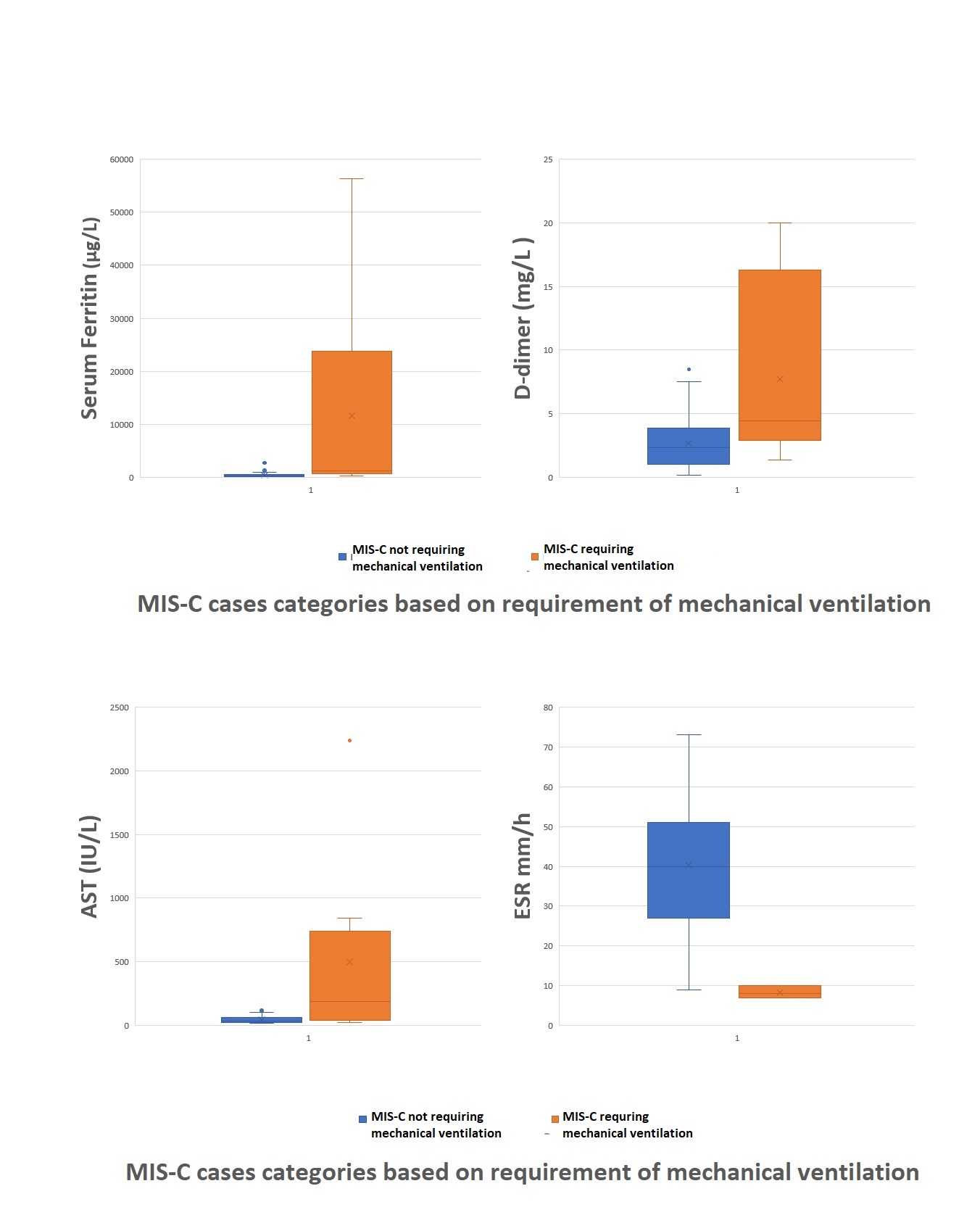Session Information
Session Type: Poster Session D
Session Time: 8:30AM-10:30AM
Background/Purpose: COVID-19 related multisystem inflammatory syndrome in children (MIS-C) has varied clinical presentation ranging from fever with mild gastrointestinal and/or mucocutaneous changes to life threatening multiorgan dysfunction. As it is a new disease and factors associated with development of severe MIS-C remain largely unknown. Hence, we planned this study to identify parameters associated with requirement of mechanical ventilation in diagnosed cases of MIS-C.
Methods: It was a cohort study conducted at two tertiary care centres in Kerala state of south India from March 2020 to April 2021. Cases diagnosed with MIS-C as per centres for disease control and prevention (CDC) case definitions were enrolled and studied for clinical profile. MIS-C cases were further categorised based on requirement of mechanical ventilation and these groups were compared for baseline clinical characteristics, laboratory parameters and echocardiographic changes in order to identify parameters associated with requirement of mechanical ventilation. Pearson Chi-Square test or Fisher’s exact test to compare the categorical variables and the independent sample t-test or Mann-Whitney test were used to compare the continuous variables by age group and severity.
Results: A total of 41 (males-23) cases diagnosed of MIS-C were enrolled in the study. The mean age at onset of MIS-C was 6.16 (SD-4.0) years. Their clinical profile was studied in age categories of less than 5 years, 5-12 years, and more than 12 years. Cases were divided into syndrome clusters of dermatological or mucocutaneous changes, gastrointestinal symptoms, Incomplete or atypical Kawasaki disease. Shock, macrophage activation syndrome (MAS), neurological symptoms, and respiratory symptoms. The heat map of these syndrome clusters in different age groups is shown in figure 1.
MIS-C cases were categorised into two groups based on requirement of mechanical ventilation; 8 (20%) cases required mechanical ventilation whereas 33 (80%) cases did not require ventilatory support. These groups were compared for various clinical, laboratory and echocardiographic parameters shown in figure 2. Out of 8 patients who required mechanical ventilation, 7(88%) had presented in shock treated with ionotropic agents, whereas out of 33 cases who did not require mechanical ventilation 14 (42%) had presented in shock necessitating use of ionotropic agents; the difference was statistically significant (p=0.045). Serum D-dimer, serum ferritin, and aspartate aminotransferase (AST) were significantly high and erythrocyte sedimentation rate (ESR) was significantly low in patients of MIS-C requiring ventilatory support as compared to them who did not require it (p < 0.05), graphical representation of statistically significant parameters is shown in figure 3.
Conclusion: In our study we found that the presence of shock requiring inotropic agent, high ferritin, high D-dimer, high AST, and low ESR were associated with the requirement of mechanical ventilation in MISC cases (p< 0.05). The constellations of these parameters could reflect an ongoing process of Macrophage Activation Syndrome (MAS) in MIS-C cases requiring mechanical ventilation.
 Heat map of syndrome clusters based on clinical presentations *
Heat map of syndrome clusters based on clinical presentations *
 Bivariate Comparison of various clinical and laboratory parameters in MIS-C cases who required mechanical ventilation versus those who did not require mechanical ventilation
Bivariate Comparison of various clinical and laboratory parameters in MIS-C cases who required mechanical ventilation versus those who did not require mechanical ventilation
 Comparison of selected laboratory parameters in MIS-C cases who required mechanical ventilation versus those who did not
Comparison of selected laboratory parameters in MIS-C cases who required mechanical ventilation versus those who did not
To cite this abstract in AMA style:
Tiwari A, Balan S, Rauf A, kappanayil M, Kesavan S, Sivadas S, Chickermane P, Vijayan A, Raj M, V A, Sudhakar A. Potential Predictors of Requirement for Mechanical Ventilation in Cases of COVID-19 Related Multisystem Inflammatory Syndrome in Children (MIS-C): Results of a Hospital-based Cohort Study from South India [abstract]. Arthritis Rheumatol. 2021; 73 (suppl 9). https://acrabstracts.org/abstract/potential-predictors-of-requirement-for-mechanical-ventilation-in-cases-of-covid-19-related-multisystem-inflammatory-syndrome-in-children-mis-c-results-of-a-hospital-based-cohort-study-from-south-i/. Accessed .« Back to ACR Convergence 2021
ACR Meeting Abstracts - https://acrabstracts.org/abstract/potential-predictors-of-requirement-for-mechanical-ventilation-in-cases-of-covid-19-related-multisystem-inflammatory-syndrome-in-children-mis-c-results-of-a-hospital-based-cohort-study-from-south-i/
